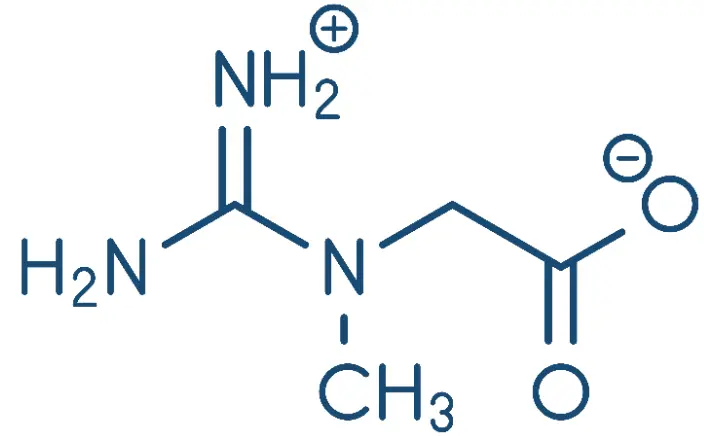What Does Creatine Do In The Body?
Creatine is a nitrogenous organic acid that exists naturally in the human body and is mainly distributed in muscle tissue. It can quickly increase muscle strength, accelerate fatigue recovery, and improve explosive power. It plays an important role in improving athletic performance and muscle growth. It is an important energy metabolism substance in the human body and plays a key role in muscle and nerve cell function. Proper supplementation of creatine can bring a variety of sports and health benefits

What Are The Health Functions Of Creatine?
It is an important organic acid that plays a variety of key roles in the human body, especially in muscle and nerve cell functions.
Provide energy: It is an essential substance for the body to produce adenosine triphosphate (ATP), which is the main energy source for muscle contraction. In high-intensity exercise or training, energy is released by breaking down creatine phosphate, which helps regenerate ATP and delay muscle fatigue.
Increase muscle strength: During exercise, muscle cells can activate a large amount of creatine, promote muscle growth and development, and thus increase muscle strength. Creatine supplementation can increase muscle power, endurance and strength, which is especially important for athletes who do high-intensity, short-term exercise such as weightlifting and sprinting.
Enhance sports performance: By increasing the level of creatine in the muscle, muscle strength, explosiveness and endurance can be improved, which is particularly suitable for high-intensity, short-term sports such as sprinting, swimming, cycling and weightlifting.
Replenish glycogen: Creatine helps to replenish the body's glycogen reserves and promotes physical recovery. Glycogen is an important energy source for muscle activity. Creatine supplementation can help maintain glycogen levels and prolong exercise time.
Maintain positive nitrogen balance: Since it is a nitrogen-containing organic acid, its production and metabolism can keep the body in a state of positive nitrogen balance. Positive nitrogen balance is an important condition for muscle growth and repair, and helps maintain and increase muscle mass.
Improve cognitive function: It helps protect the brain from certain types of injuries and diseases, such as neurodegenerative diseases such as Parkinson's disease and Huntington's disease. For people who do not eat meat often, creatine supplementation may help improve cognitive function, especially in memory and learning ability.
Promote fatigue recovery: It can increase the growth rate of muscle fibers, help strengthen muscles, and promote fatigue repair. After high-intensity exercise, creatine supplementation can accelerate the muscle recovery process and reduce recovery time.
Improve neuromuscular coordination: It can improve the coordination between nerves and muscles, and can quickly replenish energy in muscles before exercise, thereby ensuring the body's energy supply during exercise. This helps to improve athletic performance and reduce the risk of sports injuries.
Creatine not only plays an important role in improving athletic performance and promoting muscle growth, but also has a positive impact on nerve cell function, fatigue recovery and nitrogen balance in the body. These effects make creatine one of the most commonly used nutritional supplements for athletes and fitness enthusiasts.

How Does Creatine Improve Athletic Performance?
Increase creatine phosphate reserves: Stored in the muscle in the form of creatine phosphate. Supplementing creatine can increase the amount of creatine phosphate in the muscle. When performing high-intensity exercise, creatine phosphate can quickly transfer the phosphate group to adenosine diphosphate (ADP) to convert it into adenosine triphosphate (ATP), providing energy for muscle contraction and maintaining the energy supply required for muscle contraction, thereby extending the time of high-intensity exercise.
Improve ATP regeneration ability: Various activities of the human body rely on ATP to provide energy, but the amount of ATP stored in the human body is very small, and ATP is quickly consumed during exercise. It can quickly resynthesize ATP to supply energy, help the body continue to obtain energy during high-intensity exercise, and improve the ability to maintain high-intensity exercise.
Promote protein synthesis: It can promote protein production and help build muscle fibers. It can also increase the concentration of insulin-like growth factor 1 (IGF-1) in the body, enhance muscle strength and endurance, and increase muscle absorption of glucose and amino acids, providing a material basis for muscle growth.
Accelerate muscle recovery: It has antioxidant properties, can reduce exercise-induced oxidative stress and muscle damage, reduce the level of reactive oxygen species in muscle cells, reduce the production of inflammatory mediators, help relieve muscle soreness, promote recovery after exercise, and enable athletes to get into the next training faster.
Enhance neuromuscular conduction: It may affect the conduction function of neuromuscular, improve the efficiency of nerve signal transmission, make the muscle respond faster and stronger to nerve stimulation, help improve coordination and reaction speed, and allow athletes to better control body movements during exercise.
Increase calcium reuptake: It can increase the reuptake of calcium entering the muscle endoplasmic reticulum, thereby enhancing the cross-bridge circulation and force generation of muscle fibers, and delaying the occurrence of neuromuscular fatigue, cramps, and muscle strains.
Enhance glycogen resynthesis: It can promote the replenishment of carbohydrates, thereby promoting the storage of muscle glycogen. Each gram of glycogen can bind about 3 grams of water in skeletal muscle, and the increase in water brought by creatine helps to provide muscle glycogen.

Can Creatine Help Build Muscle?
Creatine can help build muscle, but it does not directly promote muscle growth. Instead, it indirectly supports muscle growth by providing energy, enhancing athletic performance, and accelerating recovery.
Provide energy: It can quickly provide energy, especially during high-intensity exercise, and help muscles continue to contract by regenerating ATP (adenosine triphosphate), which is the basis for muscle growth.
Enhance athletic performance: It stimulates muscle growth by increasing muscle strength and endurance, allowing athletes to perform more intense training.
Promote muscle growth: It can increase muscle mass and volume, and support muscle growth by increasing the capacity of muscle cells and the rate of protein synthesis.
Accelerate recovery: Creatine helps shorten muscle recovery time, allowing athletes to recover faster after high-intensity training, thereby increasing training frequency and overall results, which is very important for muscle growth.
In summary, creatine is an effective fitness supplement that can help build muscle, but it needs to be combined with a proper training and nutrition plan to achieve the best results.
Shaanxi Yuantai Biotechnology Co., Ltd. (YTBIO) was established in 2014 and is a global healthcare company headquartered in Xi'an and with a production base in Weinan. We focus on health food ingredients (such as herbal extracts, creatine monohydrate) and cosmetic ingredients (including sponge thorns, retinol, glutathione and arbutin). We work with partners in Europe, the United States, Southeast Asia and South Korea. We have a warehouse in Rotterdam for EU distribution and plan to set up a warehouse in the United States. We prioritize quality and hold certifications such as HACCP, ISO9001, ISO22000, HALAL, KOSHER, FDA, EU&NOP Organic and NMPA. We also assist Korean customers with KFDA registration. Our goal is to establish long-term partnerships through high-quality products and professional services. If you have any questions, please contact sales@sxytorganic.com or +86-029-86478251 / +86-029-86119593.
_1737093401309.png)
